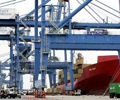Virus Clouds China’s Prospects to Meet U.S. Trade Commitments

The spread of the coronavirus and related economic uncertainty is threatening to undermine the “phase one” trade agreement that the Trump administration signed with its Chinese counterparts less than two months ago.
President Trump, who has repeatedly criticized the U.S. trade deficit with China, made purchase commitments by China a core part of the deal, with Beijing expected to buy $200 billion in additional American exports over two years, with an extra $77 billion required in 2020 and $123 billion in 2021.
Yet the virus’s spread has hurt Chinese economic demand and trade, and the ensuing drop in global energy prices and weakness in the transportation sector make it extremely unlikely China will be able to make good on the dollar commitments in the deal, economists and trade experts say.
On Monday, the Center for Strategic and International Studies released a report saying the purchase targets were already overly ambitious — and that the coronavirus has only worsened the situation.
“Not only are the numbers unrealistic, but they’re unreal,” said Scott Kennedy, China expert at the nonpartisan Washington think tank. “The likelihood of even just reaching last year’s exports is unlikely.”
Trump administration officials previously acknowledged that the coronavirus-related problems may delay expected purchases by China this year but said Chinese President Xi Jinping had assured Mr. Trump the country would meet its obligations.
Trade experts have pointed to a clause in the deal that allows for consultations “in the event that a natural disaster or other unforeseeable event outside the control” of the countries delays implementation.
The office of U.S. Trade Representative Robert Lighthizer, which is responsible for implementing the agreement, said it “has had no conversations like this with our Chinese counterparts.”
“We expect that the Chinese will meet their commitments under the agreement,” a spokesman for Mr. Lighthizer said.
The Chinese embassy in Washington didn’t immediately respond to a request for comment.
Current and former administration officials have tended to be optimistic about Beijing’s ability to catch up on the requirements of the deal, pointing out that Mr. Xi has enormous influence over state-owned enterprises that could purchase American aircraft, energy products and farm goods.
Still, the deal’s reliance on state-led firms to purchase U.S. products — often with expensive and enduring tariffs that make them less attractive — brings its own set of problems, according to the Peterson Institute for International Economics, another Washington think tank.
“It will be hard enough for China to meet this commitment as it stumbles through an economy now afflicted by the coronavirus disease,” economists Chad Bown and Mary Lovely said last week.
China on Saturday posted a 4% drop in imports in the first two months of the year, compared with a year earlier. Still, the country’s pork, soybean and natural-gas imports grew.
U.S. officials have been touting other aspects of the deal, including Beijing’s moves to open up to American chicken exports and pave the way for better protection of intellectual property in China. The emphasis on purchases in phase one differed sharply from recent Washington trade pacts, which typically prioritize lifting barriers to facilitate freer, market-based trade.
Besides the purchases, China agreed to discourage theft of trade secrets and safeguard intellectual property in the phase one deal, among other pledges.
At a rally in Pennsylvania last week, Mr. Trump was upbeat, saying the U.S. economy remained strong but is “nothing compared with what it’s going to be when the trade deals kick in.”
Still, the bigger shifts in economic rules that officials had hoped Beijing to agree to were left for future negotiations.
“The ‘phase one’ agreement leaves on the table more significant, structural commitments for a future ‘phase two’ or even ‘phase three’ agreement,” said Rep. Richard Neal, the chairman of the House committee that oversees trade, in a hearing on China trade. “Now, because of the outbreak of the coronavirus in China, purchase commitments and other promises made by China as part of this agreement may not even happen.”
As Congress heads toward the 2020 election season, Republican lawmakers have defended Mr. Trump for being the first president to confront China in high-stakes trade negotiations, saying further benefits for Americans will come down the road.
Source: Dow Jones

 Hellenic Shipping News Worldwide Hellenic Shipping News Worldwide, Online Daily Newspaper on Hellenic and International Shipping
Hellenic Shipping News Worldwide Hellenic Shipping News Worldwide, Online Daily Newspaper on Hellenic and International Shipping





















 PG-Software
PG-Software